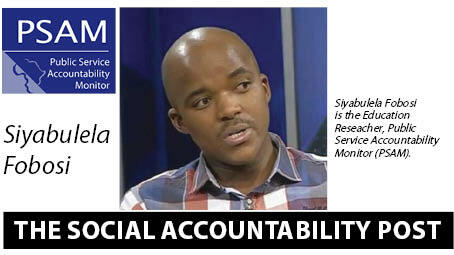In the lead-up to the 2019 General Elections for the 6th administration, the Public Service Accountability Monitor (PSAM) developed an analysis of the education budget over the 5th administration (2014 to 2018) with recommendations for the new leadership.
The history of school infrastructure provisioning in post-apartheid South Africa is inextricably linked to the struggle for the equitable distribution of public resources. In addition, while there has been noteworthy progress in ensuring universal access to primary education – the delivery of quality education and adequate infrastructure has been characterised by a range of delays and severe setbacks.
In its analysis, the PSAM notes with concern that while the budget allocated to the Department of Basic Education (DBE) increased by 4%, in nominal terms, over the 5th national administration, from R19.68 billion in 2014/15 to R24.50 billion in 2019/20 – the DBE experienced budget cuts between 2017/18 and 2018/19. For example, the budget having decreased by 3% in nominal terms, from R23.40 billion in 2017/18 to R22.72 billion in 2018/19. The poor rural black learners mostly feel the impact of these budget
cuts. The cuts result in delays in building schools and providing sanitation to existing schools. It is concerning that the department faced underspending and poor performance over the 5th national administration. For example, between 2014 and 2018 – the department had a backlog of 476 schools and built a total of 96 school. Also, between 2016 and 2018, only provided sanitation to 102 schools against a total of 807 schools.
The Eastern Cape Treasury’s 2018/19 Adjusted Estimates of Provincial Revenue and Expenditure reported poor mid-year performance in the delivery of basic services to schools. For example, the ECDoE underperformed on the provision of water to schools where only 17 schools were provided with water against the target of 169 schools.
It is therefore of concern to note reductions to the Eastern Cape Department of Education’s (ECDoE) budget during the 5th administration. For example, the Infrastructure Development programme of the department had its budget decreased from R1.65 billion in 2017/18 to R1.59 billion in 2018/19. The decrease in the allocations for the programme continued in the current financial year 2019/20, where the allocation to the programme decreased by 1% in nominal terms from the adjusted budget of R1.59 billion in 2018/19 to R1.58 billion in 2019/20. In real terms, in other words when inflation is taken into account, the allocation to the programme decreased by 3% to R1.55 billion in 2019/20.
In its budget analysis, the PSAM also reported that six (6) of the nine (9) provinces had their budget allocations for the Education Infrastructure Grant (EIG) reduced between 2017 and 2018, with the Northern Cape having experienced the highest reduction by 21% in nominal terms, from R 612 million in 2017/8 to R483 million in 2018/19. The provinces make use of the EIG to build and refurbish schools.
These budget cuts and related underperformance during the 5th administration are therefore cause for concern where public sector budgets are particularly constrained. The continued budget cuts and underperformance trends mean that most of the poor rural black learners will not benefit from quality education, as envisioned in the Action Plan to 2019: Towards the Realisation of Schooling 2030.
In conclusion, in the lead-up to the 2019 General Elections, the PSAM urges the 6th administration to ensure that there is enough funding for all historically disadvantaged provinces such as the Eastern Cape in particular given the lack of proper sanitation in the majority of schools in the province.
The PSAM calls on the Minister of Education and the provincial executive leadership within the 6th administration to ensure that poor performance is addressed in order to promote meaningful access to quality education. This can be done through the implementation of effective accountability and service delivery measures Therefore, the 6th administration must address the lack of capacity to plan and budget effectively at various administrative levels of the DBE. It is therefore imperative for provincial treasuries, departments and oversight bodies to ensure that the requisite technical capacity is provided to
infrastructure and planning units to ensure that projects are delivered effectively.
In the 2019 State of the Nation Address (SONA), President Cyril Ramaphosa explained the importance of strengthening technical capacity in government to ensure that projects move faster. In addition to this, the 6th administration must implement expenditure management processes and performance monitoring processes in order to address the underperformance challenges faced by the 5th administration. In other words, public officials must justify their performance in addressing the socio-economic rights through the delivery of basic education.


